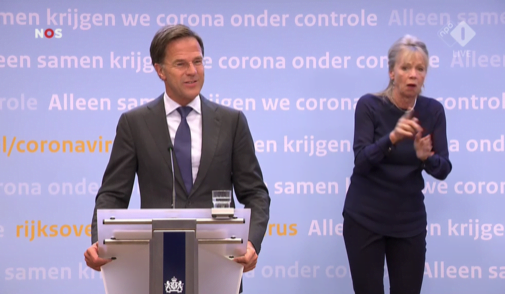The cabinet continues to struggle with the measures and, in particular, the way in which the corona virus is to be further contained. Rutte is aware that the young people do not watch his press conference and deal with the corona virus in their own way. The cabinet is also not ready for serious action with measures for the time being and is pursuing a cautious policy. It was announced that mayors can make more local policies.
There are serious concerns about the high number of young people becoming infected. That is why that group was directly addressed by the prime minister. Last week, more than half of the new infections took place in the age category 17 to 30 years. Rutte said to them: if too many of you flout the rules, we will soon all be inside again and you will be a danger to your parents, grandfathers and grandmothers and everyone around you with a vulnerable health.
tourism is not locked
It is a question of looking for measures that do not disrupt society and especially the economy too badly. In large cities, local policies can be introduced to contain troubling situations. Not a ban but rather a request. This applies in a general sense, but very specifically for the city of Amsterdam.
“I say to tourists from home and abroad here tonight, especially the mayor: avoid busy places in Amsterdam. What is worrying in the Netherlands is that the one-and-a-half meter rule is being observed less and less, that more people do not stay at home when they have complaints and that fewer people are being tested, ”says Rutte.
The virus is on a dangerous advance. The numbers don't lie. The number of infections has been increasing for several weeks in a row. And we risk forfeiting the gains we've made over the past few months. The cabinet's message is therefore simple: we do not want a second lockdown and we do not need it. But that does not happen automatically.
contact details required in the catering industry
The Cabinet has established that compliance with the basic rules in the catering industry is weakening, with all the associated consequences. That should be tighter. That is why an earlier relaxation is being reversed for catering establishments. People can still eat out and still go to the terrace. But inside and outside the following applies: sitting in a place, making a reservation, which can be done in advance or at the door, and a check-up meeting to ask if there are any health complaints.
What's new is that guests are asked to write down their names and contact details on the front, so that we can quickly track people down if necessary in the source and contact survey. Also new for catering and other recreational institutions such as museums and amusement parks is that such a location closes for a maximum of 14 days if the GGD determines that multiple infections have occurred there.
holidaymakers have to go through the test street
Travelers from risk areas who come home from those risk areas must immediately stay at home for two weeks upon return and have themselves tested for complaints. And on the basis of passenger data, the national team of the GGD will call travelers to check whether they are complying with that quarantine.
At the end of next week, Minister de Jonge hopes to set up a test street at Schiphol, and then also at other airports. At the gate of flights from countries that are now orange, people are asked to have themselves tested at Schiphol, even if they have no complaints. Because the moment of infection is unknown to travelers, they want to be sure that they have not returned with the virus in their suitcase. Such a test is a snapshot, a test result can be negative while you are still infected. That is why travelers should stay at home even if the test does not find a corona.
Also read: In Belgium, wearing face masks is mandatory even on a bicycle





